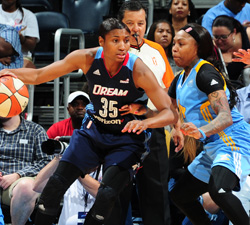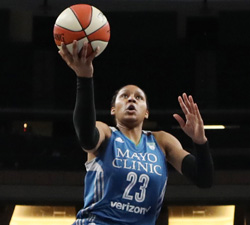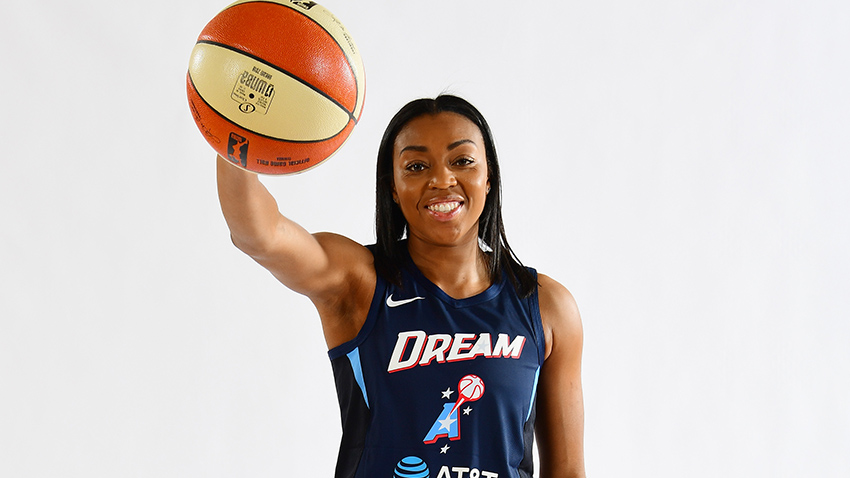Round 1 Playoff Preview: (6) Atlanta Dream vs. (7) Seattle Storm

The Atlanta Dream and Seattle Storm are both back in the WNBA Playoffs after a short hiatus – the Dream had made six straight playoffs, including three Finals appearances before missing the postseason last year, while the Storm return following a two-year absence to make their 12th playoff appearance in franchise history. During that two-year absence, the Storm added No. 1 overall picks Jewell Loyd and Breanna Stewart, who will both make their playoff debuts on Wednesday.
Setting the Stage
Under the WNBA’s new playoff format, the first two rounds of the playoffs feature single-elimination games, so it is win or go home on Wednesday at 8:00 PM ET in a game televised on ESPNews. While the Dream hold home-court advantage from being the higher seed, this game will be played at McCamish Pavilion on the campus of Georgia Tech rather than their usual home of Philips Arena.
While the Storm are just 6-11 on the road this season, one of those wins came in Atlanta – a 91-82 victory on Sept. 4. That win was part of Seattle’s remarkable run following the Olympic break that not only got them back in the playoffs, but has the entering the postseason as one of the hottest teams in the league – only top seeded Minnesota (7-2) has a better post-Olympic break record than Seattle’s 7-3.
On the other hand, the Dream went just 4-5 since the Olympic break and fell from the No. 4 seed (which would have earned them a first round bye) to the No. 6 seed over the final two weeks of the season. While the Dream didn’t find as much team success after the Olympic break, forward Angel McCoughtry returned from earning gold in Rio to lead all WNBA scorers after the break at 23.4 points per game.
Regular Season Series
Seattle won the regular season series, 2-1, picking up wins in both Seattle and Atlanta during the regular season. The composite score of the three games is separated by just a single point: 240-239 in favor of Atlanta.
June 28 at Seattle
- Storm 84, Dream 81
- Storm Leaders: Stewart 38 points (season-high)
- Dream Leaders: McCoughtry 22 points
July 5 at Atlanta
- Dream 77, Storm 64
- Storm Leaders: Loyd 13 points
- Dream Leaders: Lyttle 22 points
September 4 at Atlanta
- Storm 91, Dream 82
- Storm Leaders: Bird/Stewart 23 points
- Dream Leaders: McCoughtry 32 points (season-high)
Players to Watch
Atlanta: Angel McCoughty
Only one player (Chicago’s Elena Delle Donne) scored more points against the Storm all season than McCoughtry. In three games against the Storm, McCoughtry averaged 24.0 points on 54.2 percent shooting from the field (28.6% from three and 72.0% from the free throw line), to go with 6.0 rebounds, 2.7 assists and 2.3 steals. McCoughtry’s scoring average and shooting percentage against the Storm were her highest marks against any opponent this season.
And don’t forget that McCoughtry owns the single-game playoff scoring record with her 42-point performance against New York back in 2010. McCoughtry holds three of the top six single-game scoring performance in WNBA playoff history and her 22.2 points per game playoff average is second to only the legendary Cynthia Cooper on the all-time list.
Top Scoring Games in WNBA Playoff History
| Player | Game | Date | Points |
| Angel McCoughtry | ATL vs. NYL | Sept. 7, 2010 | 42 |
| Tamika Whitmore | IND at DET | Aug. 19, 2006 | 41 |
| Elena Delle Donne | CHI vs. IND | Sept. 21, 2015 | 40 |
| Maya Moore | MIN at PHX | Sept. 27, 2015 | 40 |
| Angel McCoughtry | ATL at CHI | Aug. 24, 2014 | 39 |
| Angel McCoughtry | ATL at MIN | Oct. 5, 2011 | 38 |
Seattle: Breanna Stewart
Just like Angel McCoughtry posted her best numbers against the Storm, Breanna Stewart did the same against the Dream, matchings McCoughtry’s scoring average at 24.0 (the fourth highest of any Dream opponent this season) and she did so on 65.7 percent shooting from the field and 42.9 percent shooting from three. She also posted 8.3 rebounds, 3.6 assists, 1.6 steals and 2.0 blocks in her three games against the Dream – numbers that are right on par with her season averages that will certainly earn her this year’s Rookie of the Year award.
Stats Spotlight
A quick breakdown of how each team scored its points throughout the regular season, including league ranking in parentheses.
| Team | %PTS 2PT | %PTS 3PT | %PTS FTS |
| Storm | 53.8 (10) | 26.6 (1) | 19.6 (9) |
| Dream | 61.7 (5) | 13.7 (12) | 24.6 (1) |
Keys to Victory for Dream
Atlanta led all teams in pace this season, averaging just under 80 possessions per 40 minutes. Considering that Atlanta is the worst-shooting team in the playoffs (44.9 effective field goal percentage ranked 11th overall), they need extra possessions to get extra shots in order to score enough points to compete.
Two key components to the Dream’s offense is attacking the offensive glass (they led the league in offensive rebound percentage at 30.5%) and getting to the free throw line (their 0.389 free throw rate also led the league). The Dream score nearly a quarter of their points from the foul line, with McCoughtry leading all players at 5.2 free throws made and 6.6 attempted this season.
On the other end of the court, Atlanta’s defense holds opponents to an effective field goal percentage of 47.0% – the third lowest percentage in the league. Considering the Storm have the second-best shooting percentage in the league (51.4%), the Dream’s ability to reduce Seattle’s efficiency on offense will be a contributing factor to their success.
Keys to Victory for Storm
While these teams finished just one game apart in the standings, their games feature distinctly contrasting styles. While the Dream are a poor shooting team that pushes the pace, living at the free throw line and crashing the offensive glass for extra possessions, the Storm are one of the league’s top shooting teams, doing most of its damage from the 3-point line, grabbing the lowest percentage of offensive rebounds in the league and no playoff team scores a lower percentage of its points from two-point range than Seattle.
For Seattle to find success on offense it must move the ball and find open shooters – they finished third in the regular season in assists (18.9) and feature the league’s assist leader in Sue Bird (5.8 per game). Seattle scores more than a quarter of its points from beyond the arc, so getting good looks from three and knocking them down will be imperative for the Storm. On the polar opposite is the Dream, which ranks last in the league in both assists per game (15.0) and percentage of points scored from three (13.7%).
On the other end of the floor, the Storm must defend without fouling, something they have excelled at all season long, posting the league’s lowest opponent free throw rate (ratio of free throws attempted per field goal attempted) at 0.256. The Storm allowed opponents to score just 17.5 percent of their points from the free throw line – also a league-best – which would take away a key component of Atlanta’s attack.


,xPosition=.5,yPosition=.5)
,xPosition=.5,yPosition=.5)
,xPosition=.5,yPosition=.5)
,xPosition=.5,yPosition=.5)